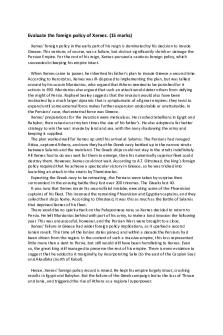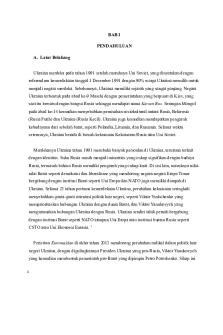Xerxes\' foreign policy - answer PDF

| Title | Xerxes\' foreign policy - answer |
|---|---|
| Author | Daniel Kassem |
| Course | History: Ancient History |
| Institution | Higher School Certificate (New South Wales) |
| Pages | 1 |
| File Size | 46.1 KB |
| File Type | |
| Total Downloads | 100 |
| Total Views | 157 |
Summary
Download Xerxes' foreign policy - answer PDF
Description
Evaluate the foreign policy of Xerxes. (15 marks) Xerxes’ foreign policy in the early part of his reign is dominated by his decision to invade Greece. This venture, of course, was a failure, but did not significantly shrink or damage the Persian Empire. For the rest of his reign, Xerxes pursued a cautious foreign policy, which succeeded in keeping his empire intact. When Xerxes came to power, he inherited his father’s plan to invade Greece a second time. According to Herodotus, Xerxes was ill-disposed to implementing the plan, but was talked around by his cousin Mardonius, who argued that Athens needed to be punished for it actions in 490. Mardonius also argued that such an attack would deter others from defying the might of Persia. Raphael Sealey suggests that the invasion would also have been motivated by a much larger dynamic that is symptomatic of all great empires: they tend to expand until some external force makes further expansion undesirable or unattainable. In the Persians’ case, that external force was Greece. Xerxes’ preparations for the invastion were meticulous. He crushed rebellions in Egypt and Babylon, then raised an army ten times the size of his father’s. He also adopted a far better strategy to win the war: invade by land and sea, with the navy shadowing the army and keeping it supplied. The plan worked well for Xerxes up until his arrival at Salamis. The Persians had ravaged Attica, captured Athens, and now they had the Greek navy bottled up in the narrow straits between Salamis and the mainland. The Greek ships could not stay in the straits indefinitely. All Xerxes had to do was wait for them to emerge, then his numerically superior fleet could destroy them. However, Xerxes could not wait. According to A.T. Olmstead, the king’s foreign policy required that he achieve a spectacular victory in Greece, so he was tricked into launching an attack in the straits by Themistocles. Expecting the Greek navy to be retreating, the Persians were taken by surprise then surrounded. In the ensuing battle they lost over 200 triremes. The Greeks lost 40. It was now that Xerxes made his second fatal mistake, executing some of the Phoenician captains of his fleet. This incensed the remaining Phoenician and Egyptian captains, and they sailed their ships home. According to Olmstead, it was this as much as the Battle of Salamis that deprived Xerxes of his fleet. There would be no quick attack on the Peloponnese now, so Xerxes decided to return to Persia. He left Mardonius behind with part of his army, to make a land invasion the following year. This was unsuccessful, however, and the Persian Wars were brought to a close. Xerxes’ failure in Greece had wider foreign policy implications, as it sparked a second Ionian revolt. This time all the Ionian states joined, and within a decade the Persians had been driven from the region. In the context of such a massive empire, this loss represented little more than a dent to Persia, but still would still have been humiliating to Xerxes. Even so, the great king still managed to preserve the rest of his empire. There is even evidence to suggest that he added to it marginally, by incorporating Saka (to the east of the Caspian Sea) and Akaufaka (north of Kabul). Hence, Xerxes’ foreign policy record is mixed. He kept his empire largely intact, crushing revolts in Egypt and Babylon. But the failure of the Greek campaign led to the loss of Thrace and Ionia, and triggered the rise of Athens as a regional superpower....
Similar Free PDFs

Xerxes\' foreign policy - answer
- 1 Pages

Foreign Policy notes
- 4 Pages

Synopsis Indian Foreign Policy
- 21 Pages

02. Qatar’s foreign policy
- 15 Pages

Foreign Policy in Latin America
- 11 Pages

Pakistan Foreign Policy 1947 to 2004
- 30 Pages
Popular Institutions
- Tinajero National High School - Annex
- Politeknik Caltex Riau
- Yokohama City University
- SGT University
- University of Al-Qadisiyah
- Divine Word College of Vigan
- Techniek College Rotterdam
- Universidade de Santiago
- Universiti Teknologi MARA Cawangan Johor Kampus Pasir Gudang
- Poltekkes Kemenkes Yogyakarta
- Baguio City National High School
- Colegio san marcos
- preparatoria uno
- Centro de Bachillerato Tecnológico Industrial y de Servicios No. 107
- Dalian Maritime University
- Quang Trung Secondary School
- Colegio Tecnológico en Informática
- Corporación Regional de Educación Superior
- Grupo CEDVA
- Dar Al Uloom University
- Centro de Estudios Preuniversitarios de la Universidad Nacional de Ingeniería
- 上智大学
- Aakash International School, Nuna Majara
- San Felipe Neri Catholic School
- Kang Chiao International School - New Taipei City
- Misamis Occidental National High School
- Institución Educativa Escuela Normal Juan Ladrilleros
- Kolehiyo ng Pantukan
- Batanes State College
- Instituto Continental
- Sekolah Menengah Kejuruan Kesehatan Kaltara (Tarakan)
- Colegio de La Inmaculada Concepcion - Cebu









